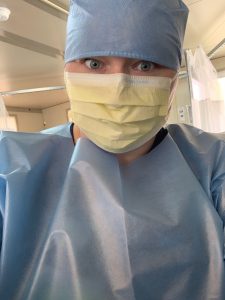August 31, 2020 ● 3 min read
By Emily Bradfield
GETTING CREATIVE DURING COVID-19
Many children see pediatric critical care physician Dr. Emily Nazarian as a superhero. With her white coat serving as her cape, she walks down the halls of Charlotte’s Novant Presbyterian Children’s hospital, fully adorned in PPE. Nonetheless, her N95 cannot mask her cheerful spirit, as she brings lightheartedness to the stressful hospital environment. However, she admits that she has had to get creative, now relying solely on warm greetings and kind words: “The mask, for me, is a barrier. If you think about how much our facial expressions relay to people — they relay my empathy, my sympathy, and my regret.” Like millions of other healthcare workers around the world, new workflows, routine COVID-19 testing, and strict visitation rules have dramatically changed Dr. Nazarian’s professional life.
According to the CDC’s most recent estimates, among the 17 million healthcare workers in the United States, there have been at least 148,384 cases and 669 deaths due to COVID-19. As striking as these numbers are, they are likely great underestimates, as healthcare worker status data is lacking. Fears of infection, increased workloads, and poor social support have made the last five months in healthcare incredibly difficult.
WEARING “MULTIPLE HATS”
Strict visitation rules crowned Certified Nursing Assistant Katy Meier a proxy family member during the summer of 2020. She worked at a continuing care facility, where she offered not only physical but also emotional/social support for her patients, who claimed that she could “read their minds”. Meier not only performed typical CNA duties, but also handled family visits, performed temperature checks, prepared for weekly resident and staff COVID-19 testing, and even delivered the mail and newspaper. Given their congregate nature and population served, nursing homes have been hit hard by the pandemic, which has increased responsibility and stress among short staffed healthcare workers.
Candidly discussing the difficulties of caring for a vulnerable population, Meier recounted one difficult morning: “I was going into the rooms, and four of the people I had woken up were crying as soon as I started talking to them. That was a lot for me to take. So, I stepped out to the break room to cry myself. That was only 7:00am; I still had the rest of the day ahead of me.” However, despite the challenging nature of working in healthcare during COVID-19, Meier affirmed that the rewarding nature of the relationships she built with her “family” made her extraordinary effort worthwhile.
RELYING ON POSITIVITY AND COMMUNITY
Registered Nurse Nicole Schroeder always feels a glimmer of hope when a recovered patient is wheeled through the hospital, their name announced over loudspeaker as part of “Code Believe”. Her hospital celebrates newly discharged long-term patients, injecting positivity into a setting where stress runs high, staff must assume every patient is positive, and a simple sneeze causes concern for COVID-19. However, Schroeder pointed to the rewards of increased community support as crucial in helping her continue to do her job.

The dedication of Dr. Nazarian, Meier, Schroeder, and all healthcare workers has been invaluable. Although the pandemic has transformed their professional and personal lives, they remain dedicated to their commitment to serving others. Referencing her passion for serving others, Dr. Nazarian explained, “My father once told me if you do something you love, you’ll never work a day in your life. And trust me, I’m tired, I’m working, but I still love what I do.”
At Heroes Health, we are thankful for the work of all of our healthcare heroes fighting against COVID-19. For this reason, we are committed to supporting those who do so much to support others. The UNC School of Medicine’s free mobile application, Heroes Health, allows healthcare workers and first responders to track their mental health and access mental health resources.
“Yellow sticky note paper with stethoscope with Thank You Hospital Workers message” by focusonmore.com is licensed under CC BY 2.0
